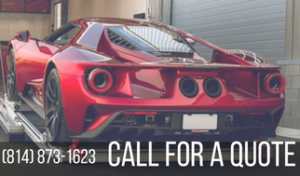If you have a low profile super car, exotic car, or race car — you know the feeling of holding your breath while loading too well. A million questions are racing through your mind including: Will my car get damaged while loading into the trailer?
Don’t put yourself through this agony! There are several solutions to lower the car loading angle so your car stays as pristine as ever before, during, and after transit; so we put together this guide to walk you through your options.
1. Low Profile Car Ramps
Loading Angle: 5-13° is standard, variation dependent on ramp choice
Price: $39.99 – $499.99 for sets of two, depending on the vendor you choose
Car ramps are the easiest and usually the least expensive way to invest in a low angle loading solution. These ramps are sturdy, usually made of a plastic polymer that can withstand substantial weight while loading on a hard, flat surface.
Low car ramps are also easy to use, as you simply drive your car up them and into the trailer. However, there is a lot of room for human error, as the ramps are oftentimes narrow and can be difficult to maneuver. Additionally, the loading angle may not offer extremely low profile super cars much clearance and may leave room for damage.
While of course you can obtain a longer ramp in order to lower the angle height, that selection in turn increases the price per ramp. The same is true for using a combination of multiple ramps; your loading angle will be lower, but your price will be higher. Also, when using multiple sets, it is difficult to secure them to each other to prevent them from becoming projectiles.
2. Ramp Extensions
Loading Angle: 9-11° is standard, variation dependent on ramp choice
Price: $300 – $827 depending on the vendor you choose
Ramp extensions are a great way to further minimize the loading angle of low car ramps for lower profile vehicles through the even more gradual incline than standard ramps. The extensions are commonly made of aluminum, making them durable and long lasting.
While the angle is lower than car ramps, it is not by much, considering how much higher the price is. However, ramp extensions do offer a more secure loading option than balancing on ramps due to the availability to have one, full width extension.
3. Low Profile Open Trailers
Loading Angle: 5-13° variation dependent on ramp choice.
Price: Between $5,000-$15,000
Opting for trailers that are specifically made for race cars or super cars is a great choice in terms of lowering the loading angle. These low profile trailers eliminate the worry of having to wiggle your car onto precarious low car ramps, giving you peace of mind while loading.
However, your car is exposed to the elements during transport. As any race car, super car, or exotic car owner will tell you — there is nothing worse than arriving to your destination with a nick in the paint of your car due to something happening during transportation; not to mention, the depreciation in value your car will experience after needing a paint repair.
4. Liftgate Trailer
Loading Angle: 3-4°
Price: $150,000-$500,000
Investing in a liftgate trailer is a surefire way to lower the loading angle due to the way the gate flattens and tapers for seamless loading. The gate moves up and down like an elevator, and can lift a car up to any level in order to bring it in. Additionally, liftgate trailers eliminate the issue of the car squeezing in between trailer inner fenders.
The word “investing” when talking about a liftgate trailer, however, is not meant to be taken lightly. Not only does the trailer itself run you on average around $200,000 — but you also will need to invest in a heavy duty truck in order to tow it.
While a liftgate trailer is a great way to keep your car safe during transport, the price tag is not for everyone.
5. Rail Ryder
Loading Angle: 3-4°
Price: price is available upon request.
The Rail Ryder system has the lowest loading angles of all of the options mentioned, and holds the title for the industry lowest loading angle of any car trailer loading method. The Rail Ryder is easy to use, one man could do it alone if needed, and is the best way to keep your car safe — no dings, dents, or scratches. The system greatly reduces the possibility of human error, so you don’t need to worry about one slip ruining your investment.
By loading your low profile car into an enclosed trailer, you are ensured safety from loading to arrival due to the lack of exposure to the elements and the secured safety of the system, knowing the car will not shift during transit.
Does Rail Ryder sound like the perfect way to ease your car loading related anxiety? Give us a call today, and inventor and owner Dale Hofius will walk you through a quote for your car and specific needs.





